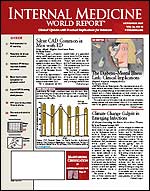Publication
Article
Internal Medicine World Report
Aspirin Averts Need for Surgery in S Aureus Endocarditis
Author(s):
By Sarah Pressman Lovinger, MD
Staphylococcus aureus
CHICAGO—More than 10,000 cases of infectious endocarditis occur in the United States annually. In the modern antibiotic era, heart failure is the most common cause of death in such patients, and survivors frequently require valve replacement surgery. New findings suggest that a simple, inexpensive treatment may help prevent the need for such invasive surgery in patients with endocarditis.
This retrospective study revealed that recent aspirin use can decrease the need for acute valve replacement surgery and the risk of cerebral hemorrhage, investigators reported at the Interscience Conference on Antimicrobial Agents and Chemotherapy.
S aureus
They analyzed 670 mostly male patients with culture-proven endocarditis who were from the International Collaboration on Endocarditis-Prospective Case Series. Of these, 132 patients were taking aspirin at the time of endocarditis diagnosis. On average, aspirin users were slightly older than nonaspirin users (age 67 vs 57, respectively).
The investigators analyzed the effect of aspirin use on 5 predefined outcomes:
- Stroke
- Embolic disease
- Congestive heart failure
- Need for acute surgery
- Overall mortality.
Aspirin use was shown to significantly decrease the need for acute valve replacement surgery to correct regurgitation, but the other 4 outcomes were unaffected. "Aspirin had no effect on the occurrence of emboli or on all-cause stroke," said Damon P. Eisen, MD, of the Royal Melbourne Hospital in Parkville, Australia.
Although aspirin use did not reduce the overall stroke risk, it did appear to diminish the risk of cerebral hemorrhage, a finding that pleasantly surprised Dr Eisen. "While no statistically significant reduction was found in stroke overall, the major concern that aspirin may increase the risk of severe bleeding, including hemorrhagic stroke, was not borne out," he said.
S aureus
Dr Eisen pointed out that the correlation between aspirin use and endocarditis outcome applied only to the pathogen analyzed in the study. "The effect of aspirin was specific to ," he asserted.
S aureus
He and his colleagues postulated that aspirin's ability to lower platelet aggregation induced by reduced the size of vegetation and thus the likelihood of valve tissue destruction.
S aureus
This study points to a potentially beneficial effect of aspirin in patients with documented endocarditis. The limitations of the study come from the lack of available data on the dose and duration of aspirin use and of any echocardiograms. Also, patients were followed for only a limited time, and the lack of randomization could have biased the results. A larger, randomized trial could provide more information on the reliability of these results, the investigators noted.
S aureus
For now, physicians should wait for further results of such studies that Dr Eisen's group and others are planning, but the hope is that they will be able to consider adding daily aspirin to antibiotic therapy in patients with known endocarditis.





